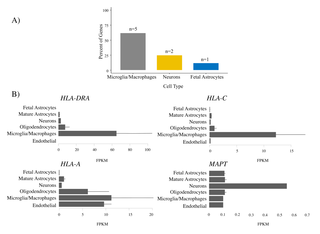PLOS Medicine ( IF 10.5 ) Pub Date : 2018-01-09 , DOI: 10.1371/journal.pmed.1002487 Iris Broce 1 , Celeste M Karch 2 , Natalie Wen 2 , Chun C Fan 3 , Yunpeng Wang 4, 5 , Chin Hong Tan 1 , Naomi Kouri 6 , Owen A Ross 6 , Günter U Höglinger 7, 8, 9 , Ulrich Muller 10 , John Hardy 11 , , Parastoo Momeni 12 , Christopher P Hess 1 , William P Dillon 1 , Zachary A Miller 13 , Luke W Bonham 13 , Gil D Rabinovici 13 , Howard J Rosen 13 , Gerard D Schellenberg 14 , Andre Franke 15 , Tom H Karlsen 16, 17, 18 , Jan H Veldink 19 , Raffaele Ferrari 11 , Jennifer S Yokoyama 13 , Bruce L Miller 13 , Ole A Andreassen 4, 5 , Anders M Dale 3, 20, 21 , Rahul S Desikan 1, 13 , Leo P Sugrue 1

|
Background
Converging evidence suggests that immune-mediated dysfunction plays an important role in the pathogenesis of frontotemporal dementia (FTD). Although genetic studies have shown that immune-associated loci are associated with increased FTD risk, a systematic investigation of genetic overlap between immune-mediated diseases and the spectrum of FTD-related disorders has not been performed.
Methods and findings
Using large genome-wide association studies (GWASs) (total n = 192,886 cases and controls) and recently developed tools to quantify genetic overlap/pleiotropy, we systematically identified single nucleotide polymorphisms (SNPs) jointly associated with FTD-related disorders—namely, FTD, corticobasal degeneration (CBD), progressive supranuclear palsy (PSP), and amyotrophic lateral sclerosis (ALS)—and 1 or more immune-mediated diseases including Crohn disease, ulcerative colitis (UC), rheumatoid arthritis (RA), type 1 diabetes (T1D), celiac disease (CeD), and psoriasis. We found up to 270-fold genetic enrichment between FTD and RA, up to 160-fold genetic enrichment between FTD and UC, up to 180-fold genetic enrichment between FTD and T1D, and up to 175-fold genetic enrichment between FTD and CeD. In contrast, for CBD and PSP, only 1 of the 6 immune-mediated diseases produced genetic enrichment comparable to that seen for FTD, with up to 150-fold genetic enrichment between CBD and CeD and up to 180-fold enrichment between PSP and RA. Further, we found minimal enrichment between ALS and the immune-mediated diseases tested, with the highest levels of enrichment between ALS and RA (up to 20-fold). For FTD, at a conjunction false discovery rate < 0.05 and after excluding SNPs in linkage disequilibrium, we found that 8 of the 15 identified loci mapped to the human leukocyte antigen (HLA) region on Chromosome (Chr) 6. We also found novel candidate FTD susceptibility loci within LRRK2 (leucine rich repeat kinase 2), TBKBP1 (TBK1 binding protein 1), and PGBD5 (piggyBac transposable element derived 5). Functionally, we found that the expression of FTD–immune pleiotropic genes (particularly within the HLA region) is altered in postmortem brain tissue from patients with FTD and is enriched in microglia/macrophages compared to other central nervous system cell types. The main study limitation is that the results represent only clinically diagnosed individuals. Also, given the complex interconnectedness of the HLA region, we were not able to define the specific gene or genes on Chr 6 responsible for our pleiotropic signal.
Conclusions
We show immune-mediated genetic enrichment specifically in FTD, particularly within the HLA region. Our genetic results suggest that for a subset of patients, immune dysfunction may contribute to FTD risk. These findings have potential implications for clinical trials targeting immune dysfunction in patients with FTD.
中文翻译:

额颞叶痴呆的免疫相关遗传富集:全基因组关联研究的分析
背景
多种证据表明,免疫介导的功能障碍在额颞叶痴呆(FTD)的发病机制中发挥着重要作用。尽管遗传学研究表明免疫相关位点与 FTD 风险增加相关,但尚未对免疫介导的疾病和 FTD 相关疾病谱之间的遗传重叠进行系统研究。
方法和结果
利用大型全基因组关联研究 (GWAS)(总数= 192,886 例病例和对照)和最近开发的量化遗传重叠/多效性的工具,我们系统地鉴定了与 FTD 相关疾病(即 FTD)联合相关的单核苷酸多态性 (SNP) 、皮质基底节变性 (CBD)、进行性核上性麻痹 (PSP) 和肌萎缩侧索硬化症 (ALS),以及 1 种或多种免疫介导疾病,包括克罗恩病、溃疡性结肠炎 (UC)、类风湿性关节炎 (RA)、1 型糖尿病 ( T1D)、乳糜泻(CeD)和牛皮癣。我们发现 FTD 和 RA 之间的遗传富集高达 270 倍,FTD 和 UC 之间的遗传富集高达 160 倍,FTD 和 T1D 之间的遗传富集高达 180 倍,FTD 和 CeD 之间的遗传富集高达 175 倍。相比之下,对于 CBD 和 PSP,6 种免疫介导疾病中只有 1 种产生了与 FTD 相当的遗传富集,CBD 和 CeD 之间的遗传富集高达 150 倍,PSP 和 RA 之间的遗传富集高达 180 倍。此外,我们发现 ALS 和所测试的免疫介导疾病之间的富集程度最低,而 ALS 和 RA 之间的富集水平最高(高达 20 倍)。对于 FTD,在联合错误发现率 < 0.05 且排除连锁不平衡中的 SNP 后,我们发现 15 个已识别位点中的 8 个位点映射到 6 号染色体 (Chr) 上的人类白细胞抗原( HLA)区域。我们还发现了新的候选基因LRRK2(富含亮氨酸重复激酶 2)、TBKBP1(TBK1 结合蛋白 1)和PGBD5(piggyBac 转座元件衍生 5)内的 FTD 易感位点。从功能上讲,我们发现 FTD 免疫多效性基因(尤其是HLA区域内)的表达在 FTD 患者死后脑组织中发生改变,并且与其他中枢神经系统细胞类型相比,在小胶质细胞/巨噬细胞中富集。主要研究局限性是结果仅代表临床诊断的个体。此外,考虑到HLA区域复杂的相互关联性,我们无法定义 Chr 6 上负责多效性信号的特定基因。
结论
我们特别在 FTD 中展示了免疫介导的遗传富集,特别是在HLA区域内。我们的遗传学结果表明,对于一部分患者来说,免疫功能障碍可能会增加 FTD 风险。这些发现对于针对 FTD 患者免疫功能障碍的临床试验具有潜在意义。











































 京公网安备 11010802027423号
京公网安备 11010802027423号